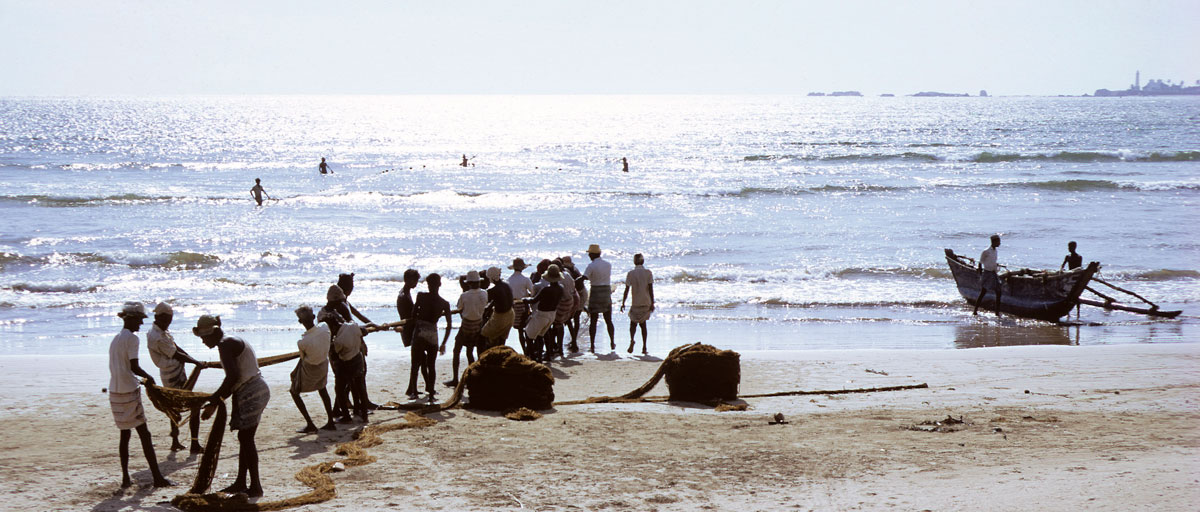
Present tropical coastal management is woefully inadequate, a new study shows. What is needed is a major effort and strong political will to build the holistic, regional-scale view of coastal management that is lacking in most locations. Photo: N. Kautsky/Azote
Coastal resource management
Treat the sea like land
More than two billion people at risk unless tropical coastal seas are managed like farms, parks or cities, scientists warn
- Two dozen leading international marine scientists call for better governance of tropical coastal seas
- Current management efforts frequently fail because they are too small scale, focus on single issues or imposed from “outside
- More forward thinking is needed to manage the future challenges instead of being reactive to current and historical situations
Two dozen leading international marine scientists, including centre researcher Tim Daw, have called on societies to apply a level of planning widely practiced in land management to the governance of Earth’s coastal ocean waters as well.
Writing in the journal Marine Pollution Bulletin, the 24 scientists note that one fifth of humanity lives within 100 km of a tropical coastline, mostly in developing countries.
Growing coastal populations and worsening impacts of climate change ensure that the pressures on tropical coastal waters will only grow. Present management effort is woefully inadequate.
"We have tended to think of the seas as our last great wilderness while subjecting them, particularly along many tropical shores, to levels of human activity as intense as those on land. The result is widespread overfishing, pollution and habitat degradation,” says lead author Peter Sale of the UN University’s Canadian-based Institute for Water, Environment and Health.
"We zone land for development, for farms, for parks, for waste disposal and other human needs. Required today is a comparable degree of care and planning for coastal ocean waters if we are to avoid irreparable degradation of the bounty and services on which so many people depend for food and well-being."
Why management fail
Co-author Tim Daw warns that the combined challenges of climate change and population growth will inevitably force a change in marine and coastal management.
"It is clear that tropical coastal seas will look very different by 2050. We need to strategically manage these upcoming issues in a way that considers the many ways people use these seas, such as transportation, fishing, aquaculture and conservation of biodiversity”
Tim Daw, co-author
Daw encourages a more forward thinking about how we will manage these future challenges instead of being reactive to current and historical situations.
Furthermore, the authors argue, there are already exciting technologies and sufficient know-how to substantially improve the way we manage tropical coastal seas, but they are not effective applied.
According to Daw and his colleagues, attempts to improve management frequently fail because they:
- are mounted at too small a geographic scale and/or over too short a period of time
- focus on single issues (conservation, fisheries enhancement, land-based pollution) without regard to other problems that act together to degrade coastal environments
- are imposed from “outside,” often in a one-size-fits-all or cookie-cutter approach, without the consultation and consensus-building needed to gain real traction with the local community, management agencies or governments.
Balance competing needs
What is needed is a major effort and strong political will to build the holistic, regional-scale view of coastal management that is lacking in most locations. Such an approach can help balance the growing number of competing needs from fisheries, aquaculture, shipping, oil, gas and mineral extraction, energy production, residential development, tourism and conservation.
At the moment, we are trying to map such uses onto marine spaces with insufficient attention to competing needs,” says Tim Daw.
"The need for more systematic planning is clearly apparent along tropical coasts, where so much of the population depends directly on the adjacent sea for livelihood and well-being. Here, we face a challenge, and an opportunity, to put in place truly effective management of coastal waters, and improve the lives of millions of people," he says.
Among the suggested management strategies is Marine Spatial Planning (MSP), an objective procedure for prioritizing among competing uses, to partition portions of the coastal ocean.
Using MSP as an operational procedure within projects should both regularize competing uses along a coastline, and jump-start the collaboration among participating management agencies, and the more holistic outlook that are so frequently missing.
"We would be naïve to imply that success will come easily. It won’t. Changing management practice to the extent, and at the scale we propose will require very careful, sustained attention to socio-economic and governance dynamics. This is a major challenge for governments, for NGOs, for the multinational sector, and for coastal communities. And it needs to be tackled now," says co-author Patrick Christie, University of Washington, Seattle.
cENTRE AUTHOR
Content facts...
Tim Daw studies coastal resource systems and linkages between ecological and social components of fisheries. He has worked with a range of small-scale tropical and industrial high-latitude fisheries and has a background training in ecology, fisheries science, socioeconomics and politics.
Visiting address: Albanovägen 28. Disability entrance: Albanovägen 18
Deliveries: Roslagsvägen 28
Postal address (courier packages):
Stockholms Universitet
Stockholm Resilience Center
[Recipient]
Frescativägen 8
114 18 Stockholm
Sweden
Postal address (letters):
Stockholms Universitet
Stockholm Resilience Center
[Recipient]
Frescativägen 8
SE-106 91 Stockholm
Sweden
Phone: +46 8 674 70 70
Organisation number: 202100-3062
VAT No: SE202100306201






